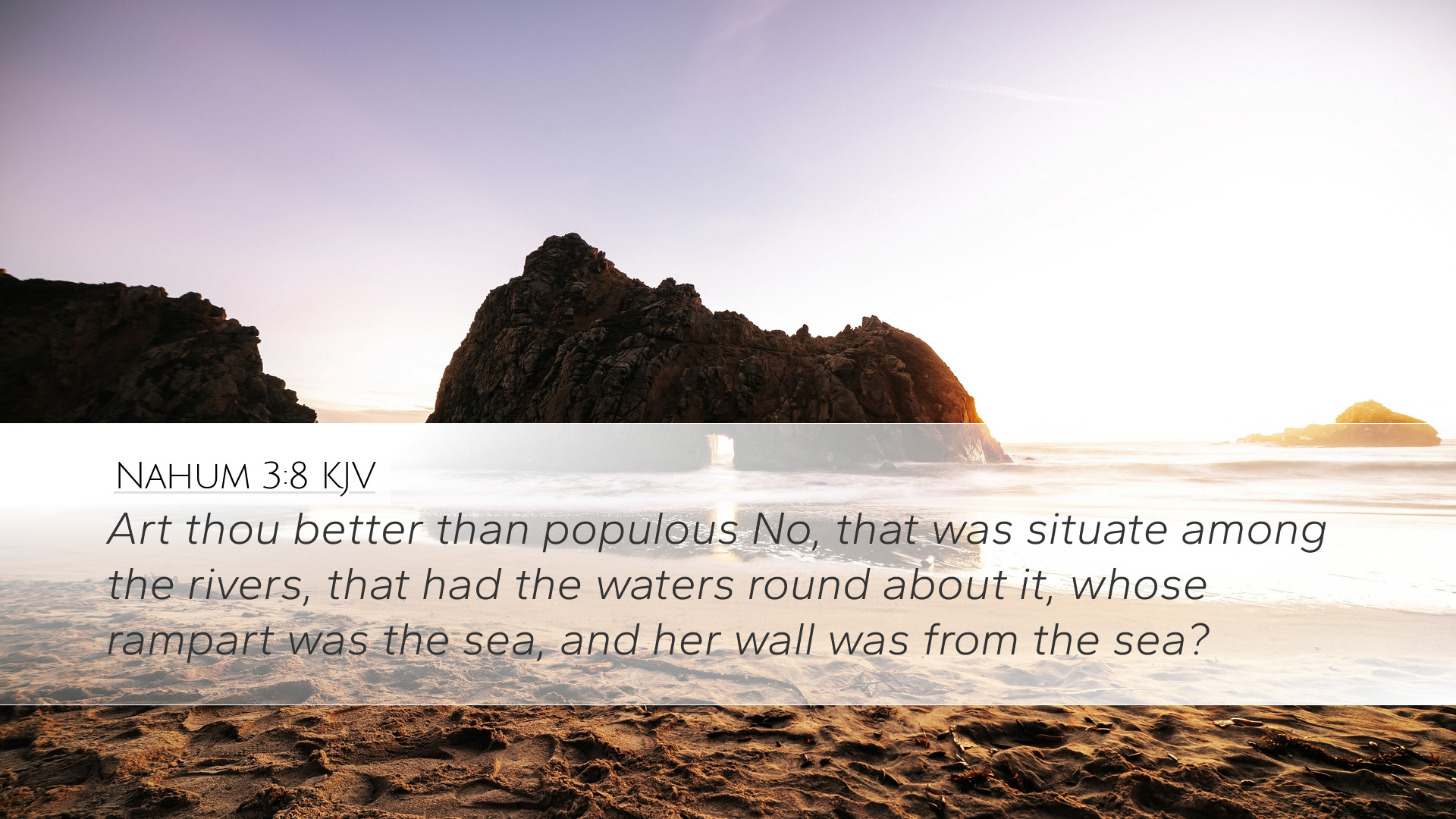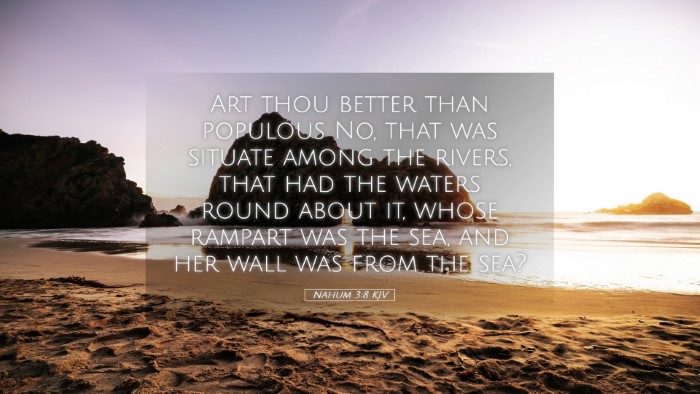Old Testament
Genesis Exodus Leviticus Numbers Deuteronomy Joshua Judges Ruth 1 Samuel 2 Samuel 1 Kings 2 Kings 1 Chronicles 2 Chronicles Ezra Nehemiah Esther Job Psalms Proverbs Ecclesiastes Song of Solomon Isaiah Jeremiah Lamentations Ezekiel Daniel Hosea Joel Amos Obadiah Jonah Micah Nahum Habakkuk Zephaniah Haggai Zechariah MalachiNahum 3:8
Nahum 3:8 KJV
Art thou better than populous No, that was situate among the rivers, that had the waters round about it, whose rampart was the sea, and her wall was from the sea?
Nahum 3:8 Bible Commentary
Commentary on Nahum 3:8
Nahum 3:8 reads: "Art thou better than populous No, that was situate among the rivers, that had the waters round about it, whose rampart was the sea, and her wall was from the sea?"
Introduction
The Minor Prophets of the Old Testament bring forth poignant reflections on divine justice and the consequences of human sinfulness. Nahum is a prophetic book that particularly addresses the impending downfall of Nineveh, the capital of the Assyrian empire. In this verse, Nahum draws a powerful comparison between Nineveh and ancient Thebes, known as "populous No" in the prophetic narrative. This commentary seeks to explore the depths of this verse through insights from renowned biblical scholars.
Contextual Overview
The prophecy of Nahum is directed towards Nineveh, which had once repented during Jonah's preaching but had reverted to its violent and idolatrous ways. The city’s impending doom reflects God's sovereignty and the fulfillment of His covenant justice.
Thebes, located in Egypt and referred to as "populous No," serves as the historical backdrop for Nahum's comparison. The metaphorical usage of Thebes not only underscores the might and eventual downfall of empires but also serves to warn Nineveh about its unrepentant ways.
Insights from Commentaries
-
Matthew Henry:
Henry points to the providence of God as the ultimate force behind the rise and fall of nations. He suggests that Nineveh should take heed from the fate of Thebes, a city once grand but now reduced to ruins. His reflections remind us of the transient nature of earthly power and pride.
-
Albert Barnes:
Barnes provides a detailed exegesis that emphasizes the geographic and strategic advantages of Thebes, which were not enough to save it from destruction. He notes that despite its strong defenses, Thebes could not withstand divine judgment. This serves as a sobering reminder that human strength is ultimately futile without adherence to God's will.
-
Adam Clarke:
Clarke elaborates on the historical context of Thebes and its significance in Egyptian history. He expresses the notion that Nineveh's pride and idolatry would lead to an equally devastating fate. Clarke uses this illustration to critique the arrogance that precedes destruction and to call for humility among nations.
Thematic Analysis
-
Divine Sovereignty:
This verse encapsulates the theme of divine sovereignty as it highlights the fallibility of human power in contrast to God's ultimate authority. Just as Thebes fell despite its might, so too would Nineveh meet its doom.
-
Consequences of Sin:
The comparison serves as a prophetic warning, indicating that unrepentant behavior and intercessory neglect lead to inevitable judgment. The historical reference emboldens Nahum's conviction that God's justice will prevail.
-
Humility and Repentance:
The passage evokes a need for self-reflection among nations and individuals alike. In recognizing the infrastructural and defensive legacies of past civilizations, the call to humility resounds: power must be tempered with righteousness.
Applications for Today
For pastors, students, and theologians, Nahum 3:8 invites reflection on modern geopolitical contexts. The lesson of Thebes can be illuminating for societies steeped in pride and complacency. It is crucial to remember the impermanence of human achievements and the consistent nature of divine justice.
Furthermore, this prophecy can serve as both a warning and an opportunity for repentance. As communities evaluate their values and priorities, Nahum's message reinforces the need for return to godliness and avoidance of destructive paths.
Conclusion
Nahum 3:8 acts as a powerful reminder of the precariousness of human power and the absolute justice of God. Drawing from historical events encapsulated in scripture, we as modern readers are compelled to navigate our own lives with an awareness of divine accountability. May we heed the warnings of the past and strive for righteousness in our current contexts.


